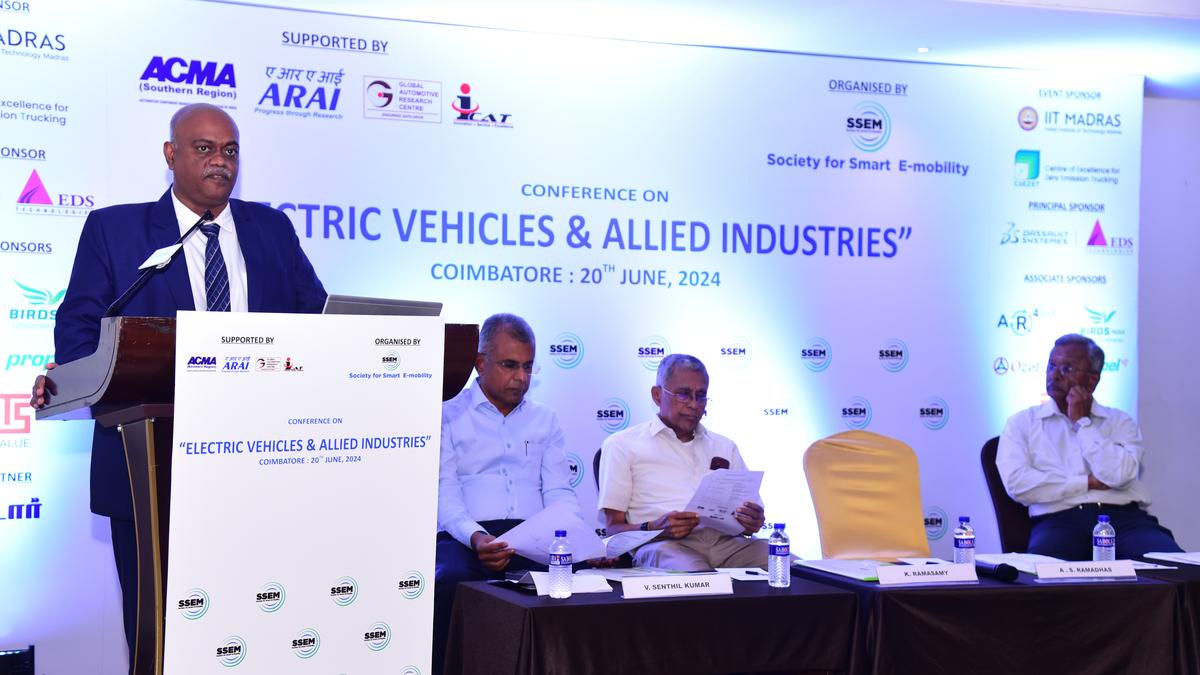
‘EV industry in Tamil Nadu has immense growth potential’
The Hindu
The EV industry in Tamil Nadu has immense growth potential as it already enjoys almost 50 % market share in EVs in the country. The government should support for investments in charging network and battery development. It should also enable transition of MSMEs in Coimbatore to the EV sector
Around 40% of the Electric Vehicle (EV) four-wheelers and close to 70% of the EV two-wheelers sold in the country are made in Tamil Nadu, said A.S. Ramadhas, director of Global Automotive Research Centre, in Coimbatore on Thursday.
Speaking at the inaugural session of a conference on “Electric Vehicles and Allied Industries - Electric Vehicles, the Future of Mobility”, organised by the Society for Smart E-Mobility (SSEM), he said the numbers showed the growth potential for the EV industry in Tamil Nadu.
Till last financial year, 38.50 lakh EVs were sold in the country. Of this, 95% accounted for two and three-wheelers and four-wheelers were 1.67 lakhs and buses were 7,700.
The NITI Aayog had projected that till 2030 the EV sector would grow at 49% compounded annual growth rate. India launched EV30@30 campaign aiming at 30% EV sales by 2030. To achieve this vision, there was a need of a robust charging infrastructure, and collaborative efforts among the Central and State governments and the local authorities.
According to K. Ramasamy, patron and trustee of SSEM and chairman of Roots Group of Companies, “India’s transition towards e-mobility has been an ongoing process.” Access to a robust network of EV charging infrastructure was essential. Though the Central government instituted various policies to promote development of the charging infrastructure network, there was a need to customise it to the unique Indian transport ecosystem and build capacity among stakeholders for on-ground expansion.
Lithium-ion Batteries (LIBs) were becoming extremely popular in energy storage applications. But, a substantial fire risk was associated with their use. India’s diverse driving conditions and mix of terrains demanded the best in reliability, ruggedness, performance, and safety.
The Electric Mobility Promotion Scheme, 2024, a limited fund scheme of ₹500 crore for four months, aimed to boost the adoption of electric two-wheelers and three-wheelers till July 31. The scheme targeted supporting 3.72 lakh EVs, specifically prioritising vehicles equipped with advanced batteries for incentives.

The Karnataka government has drafted a comprehensive master plan for the integrated development of Kukke Subrahmanya temple, the State’s highest revenue-generating temple managed by the Hindu Religious Institutions and Charitable Endowments Department. The redevelopment initiative is estimated to cost around ₹254 crore and aims to enhance infrastructure and facilities for devotees.












